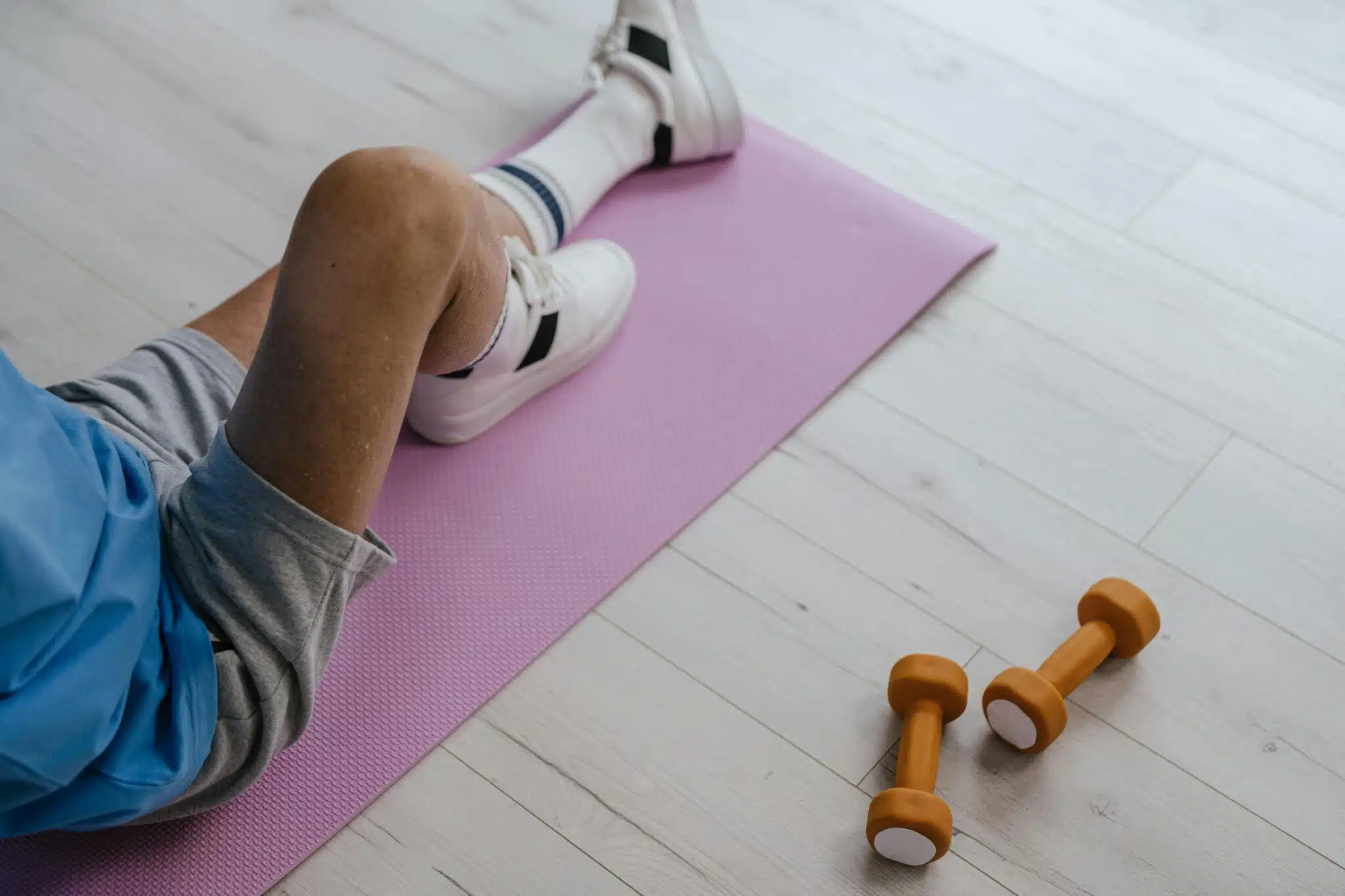
Recovering from an injury or struggling with mobility issues? Exercise and rehabilitation can help you regain strength, flexibility, and function so you can return to your daily activities with confidence. Whether you're healing from surgery, managing a chronic condition, or looking to prevent future injuries, a structured rehabilitation program can support your recovery journey.
Exercise and rehabilitation involve targeted movements designed to restore muscle balance, improve joint stability, and enhance overall physical performance. By incorporating strength training, stretching, and mobility exercises, this therapy can reduce pain, prevent re-injury, and promote long-term health. Personalized programs cater to your specific needs, ensuring a safe and effective path to recovery.
If pain or limited mobility is holding you back, a well-designed rehabilitation plan can make all the difference. Take the first step toward improved movement and a healthier lifestyle with expert-guided exercise therapy. Visit Washington Wellness Center in Robbinsville Township, NJ to explore how our services can support your wellness goals.





At Washington Wellness Center, our Exercise and Rehabilitation service is designed to help patients regain strength, improve mobility, and enhance overall wellness following injury or illness. Our skilled chiropractors work closely with individuals to create customized exercise plans that target specific needs and goals. By integrating therapeutic exercises with hands-on chiropractic care, we ensure a holistic approach to recovery that promotes healing and prevents future issues. Whether you're recovering from a sports injury, managing chronic pain, or simply looking to improve your functional fitness, our compassionate team is dedicated to guiding you every step of the way towards a healthier, more active lifestyle. Complete your patient forms to ensure a smooth and efficient visit.
Psychological support plays a critical role in exercise rehabilitation, especially for patients dealing with multifaceted health challenges. The intersection of mental health conditions and physical rehabilitation can significantly impact patient outcomes. Effective communication with clinicians fosters an environment where patients feel empowered to engage in their recovery process. Tailored approaches, such as motivational interviewing, help address individual barriers to exercise adherence, enhancing overall participation in prescribed physical activity regimens.
Understanding the psychological aspects of rehabilitation also involves recognizing the influence of motivation and behavior change in patient progress. Factors such as self-efficacy and resilience contribute to a patient’s ability to sustain exercise routines. Given the diverse experiences among patients, a comprehensive evaluation of mental health alongside physical rehabilitation is essential. Implementing strategies that improve psychological well-being, such as stress management techniques and social support systems, can lead to improved health-related quality of life and better adherence to exercise protocols.
Mental health conditions significantly impact the recovery process for individuals with chronic diseases. Anxiety and depression can hinder motivation and self-efficacy, making adherence to exercise regimens more challenging. Research indicates that addressing these psychological barriers is essential for enhancing clinical outcomes. Strategies such as mindfulness and cognitive-behavioral therapy can complement exercise rehabilitation efforts, boosting confidence and encouraging a proactive approach to health management.
Physical therapists play a crucial role in recognizing and addressing the psychological aspects of rehabilitation. By incorporating mental health assessments like the Hospital Anxiety and Depression Scale, practitioners can tailor exercise programs that cater not only to physical needs but also to emotional well-being. Creating a supportive environment fosters improved patient engagement and adherence to prescribed exercise protocols, ultimately promoting a holistic recovery process that encompasses both body and mind.
Many patients face numerous barriers when it comes to engaging in effective exercise rehabilitation programs. Common challenges include limited access to facilities and equipment, lack of transportation, and financial constraints. For some individuals, existing health conditions or physical limitations further complicate participation in rehabilitation activities. Additionally, motivational issues and feelings of self-doubt can deter patients from committing to a regular exercise regimen. These psychological factors often play a crucial role in influencing adherence to prescribed workouts.
Educational disparities also impact the effectiveness of exercise rehabilitation. Patients may lack an understanding of how to perform exercises safely or might be unaware of the specific health benefits associated with rehabilitation workouts. Misconceptions about exercise intensity and frequency can lead to improper execution and result in injuries, which ultimately hinders recovery. Providing comprehensive education and support is essential in addressing these barriers, allowing individuals to navigate their unique challenges and work toward their rehabilitation goals effectively.
Navigating the landscape of exercise rehabilitation can be daunting for many patients. Various obstacles, such as lack of motivation, physical limitations, and existing health conditions, often hinder progress. For individuals suffering from chronic pain or fatigue, simple workouts can feel overwhelming. Additionally, low health literacy may contribute to misunderstandings about the importance of compliance with rehabilitation protocols. Patients may be unsure of how to effectively engage in activities like strength training or stretching exercises, leading to frustration and a lack of adherence to prescribed routines.
To foster an environment conducive to recovery, it is essential to identify these barriers and provide tailored support. Healthcare professionals, including physical therapists and chiropractors, can play a pivotal role in crafting personalized rehabilitation plans that account for individual challenges. Goal-setting and the incorporation of social support can enhance motivation and accountability. Furthermore, utilizing appropriate educational resources can improve health literacy, empowering patients to take charge of their rehabilitation journey. By addressing these challenges head-on, a more effective path to recovery can be established.
Physical activity plays a vital role in both preventive healthcare and therapeutic strategies for various conditions. Different exercise modalities have been shown to affect health outcomes significantly, including improvements in cardiovascular health, weight management, and mental well-being. Studies indicate that activities such as swimming, cycling, and yoga therapy can enhance peak oxygen consumption, reduce the risk of myocardial infarctions, and contribute to disease management for conditions like type 2 diabetes and chronic low back pain. Diverse exercise practices cater to different patient needs, allowing for tailored rehabilitation plans that consider specific health problems and individual capabilities.
Research demonstrates that exercise not only alleviates physical symptoms but also strengthens emotional resilience and self-efficacy. In addressing psychological components of health, incorporating exercise into rehabilitation programs can lead to better clinical outcomes and improved overall quality of life. Rigorous data analysis from clinical trials highlights the importance of considering potential barriers, such as comorbidities and the patient's mental health condition. This understanding enhances healthcare delivery, encouraging shared decision-making between patients and practitioners, ultimately promoting effective engagement in their rehabilitation journey.
Clinical trials provide critical insights into the efficacy of various exercise modalities in promoting rehabilitation for individuals with chronic medical conditions. Research has shown that structured exercise programs can significantly enhance quality of life, improve physical function, and reduce risk factors associated with diseases such as type 2 diabetes mellitus, chronic kidney disease, and chronic obstructive pulmonary disease. Controlled trials often highlight the benefits of targeted interventions like Pilates and aerobic exercises, demonstrating improvements in mood, motivation, and overall health—a crucial aspect for patients dealing with disabilities or long-term health issues.
Evidence from meta-analyses contributes to understanding how exercise prescription tailored by exercise physiologists and therapists can address specific patient needs. Researchers emphasize the importance of consistent exercise habits, as they can lead to primary prevention of serious health complications such as cardiovascular events. Additionally, findings indicate that even patients with conditions like non-alcoholic fatty liver disease or sleep disturbances can achieve significant health improvements through proper exercise interventions. The incorporation of telehealth into rehabilitation programs has also been explored, providing accessible solutions that complement traditional healthcare methods and enhance patient adherence to exercise routines. For a holistic approach to wellness, explore our lifestyle and nutritional counseling services to support your rehabilitation journey. Our chiropractors accept most insurance plans, making holistic treatments more accessible to those in need of care.
Psychological support is crucial in exercise rehabilitation as it helps patients address mental health conditions, build resilience, and maintain motivation throughout their recovery process.
Mental health conditions can hinder a patient's ability to engage in physical activity, impact their motivation, and affect their overall outlook on recovery, making it essential to address these issues to enhance rehabilitation outcomes.
Common barriers include physical limitations, lack of motivation, mental health challenges, lack of access to resources, and inadequate support systems, all of which can impede progress in rehabilitation.
Patients can identify challenges by reflecting on their experiences and seeking feedback from healthcare providers. Overcoming these challenges often involves setting realistic goals, accessing support, and adapting exercise plans to fit individual needs.
Clinical trials provide valuable evidence on the effectiveness of various exercise modalities, helping to shape rehabilitation strategies that are scientifically backed and tailored to improve patient outcomes.
Copyright © Washington Wellness Centers. All Rights Reserved